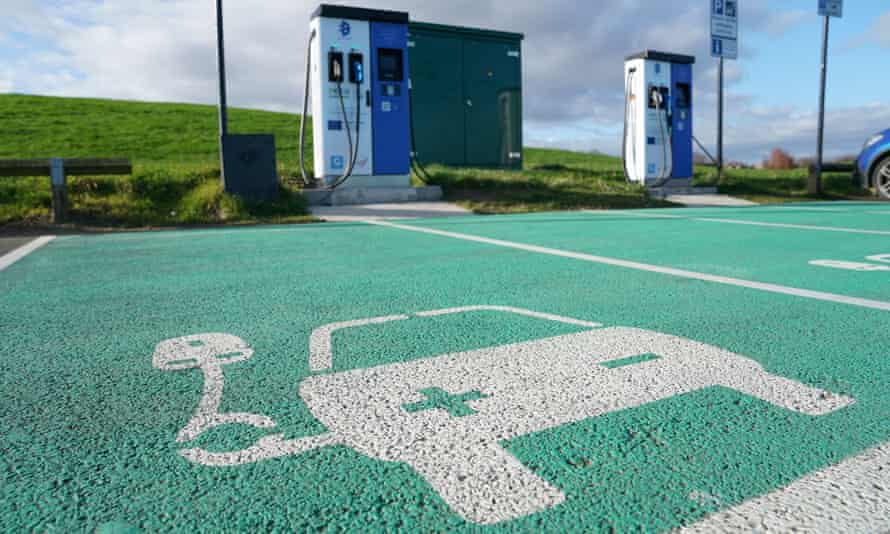Electric cars: UK government urged to prevent ‘charging deserts’
Competition watchdog investigates dominance of one provider across motorway service stations

Last modified on Fri 23 Jul 2021 14.28 EDT
The UK’s competition authority has called for the government to intervene in the electric car charger market to prevent “charging deserts” and increase availability in locations outside London, which remain underserved.
The Competition and Markets Authority (CMA) also said it had opened an investigation into the dominance of one provider, Electric Highway, in the fast-charging network at motorway service stations.
Electric cars are a crucial part of the UK’s plan to reach net zero carbon emissions by 2050 as part of its effort to alleviate the climate crisis, and the government announced in 2020 that sales of new petrol and diesel cars would be banned by 2030.
However, the industry has long argued that much more public investment is needed to solve a chicken and egg problem: some consumers are put off from buying an electric car because of poor charger availability but charger companies are unwilling to invest until enough consumers have bought them.
Forecasts cited by the CMA suggest the public charger network needs to expand by at least 10 times by 2030, from the current 25,000 to between 280,000 and 480,000 public charge points. A quarter of UK households – 8m – will be unable to install chargers at home.
However, a study by the regulator published on Friday suggested Britons faced a “postcode lottery” for access to public chargers. Outside London there are only 1,000 on-street chargers across the whole of the UK, while within the capital there are 4,700.
The CMA said the government needed to accelerate investment in rapid-charging networks, provide more funding and support to local authorities to invest in charger networks, and make it easier and cheaper for companies to connect new chargers to the electricity grid. The government should also consider targeting extra funding off the motorway in more remote locations, the regulator said.
It also expressed serious concerns about the dominance of Electric Highway, a subsidiary of the private energy company Gridserve, in the provision of the motorway fast-charger network. Electric Highway has exclusivity agreements with Roadchef, Moto and Extra, motorway services providers who cover about two-thirds of UK motorway service stations.
“We are concerned that these arrangements increase barriers to entry for other chargepoint operators,” the CMA said, adding that they risked undermining the government’s GBP950m rapid charging fund, which invests in the infrastructure for chargers on busy routes.
In a statement, Gridserve said its chargers already aligned with the CMA’s principles on being open to all.
It said: “Our focus is to find a path forward that addresses the concerns raised by the CMA, enabling us to retain momentum and continue to swiftly deliver the net zero charging infrastructure plans and investment we have worked so hard to put in place.”
Dale Vince, founder of Ecotricity, the energy company which sold the Electric Highway network to Gridserve in June, said: “We remain confident that no competition laws have been broken. We have not impeded the electric vehicle charging market – we created it a decade ago in order to kickstart the electric car revolution in Britain.”
The CMA also warned of possible “subscription traps” to access fragmented charge point payment systems. Only 9% of public chargepoints have the option of contactless bank account payment, it said – a stark contrast to petrol stations which are almost universally open to every driver without signing up for an account.
Andrea Coscelli, the chief executive of the CMA, said: “Some areas of the rollout are going well and the UK’s network is growing – but it’s clear that other parts, like charging at motorway service stations and on-street, have much bigger hurdles to overcome.
“There needs to be action now to address the postcode lottery in electric vehicle charging as we approach the ban on sales of new petrol and diesel cars by 2030.”
The UK car industry backed the call for urgent action. Mike Hawes, chief executive of the Society of Motor Manufacturers and Traders, said the government needed to “make recharging as simple and accessible as refuelling.”
“This means dramatically increasing the number of chargepoints, especially on residential streets and in rural areas, making sure they are reliable and simplifying how drivers pay,” he said.
The Department for Transport pointed to GBP1.3bn in funding for new charging infrastructure. A spokesman said: “We want chargepoints to be accessible, affordable and secure, which is why we welcome the CMA’s report and will consider the findings and recommendations carefully.”